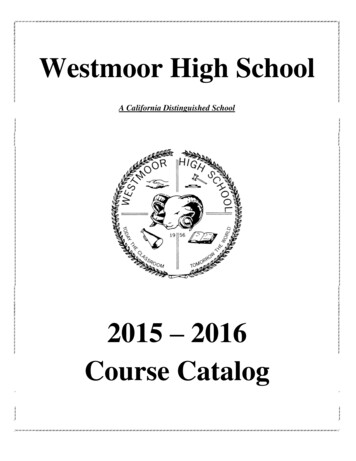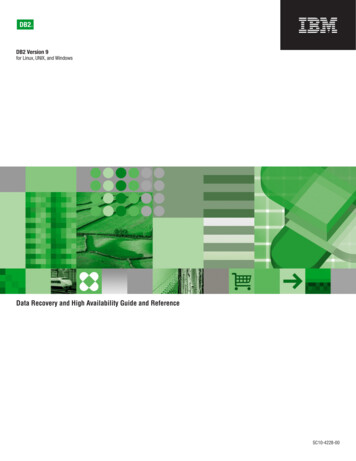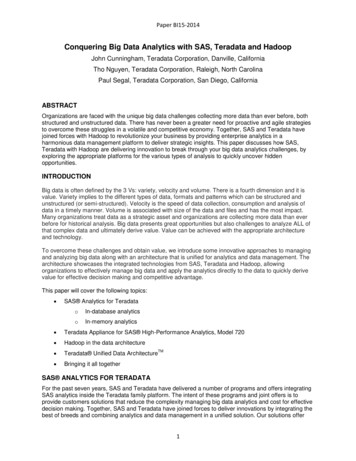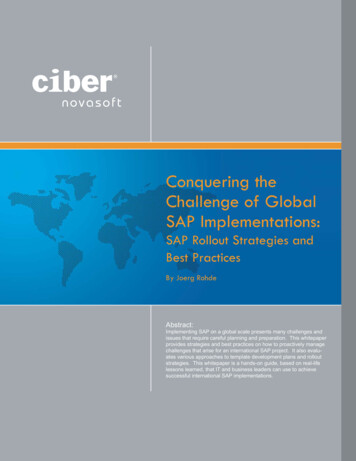
Transcription
THE HISTORY OF THE CONQUERINGOF THE BEING OF AFRICANS THROUGHLAND DISPOSSESSION, EPISTEMICIDEAND PROSELYTISATIONTshepo LephakgaDepartment of Philosophy, Practical and Systematic TheologyUniversity of South Africalephat@unisa.ac.zaABSTRACTThis paper examines the role of colonisation in the conquering of the Being ofAfricans. It is pointed out that the colonisation of Africa became possible onlybecause the church particularly the Catholic Church and the Protestants gave backing to it. Colonialism and Christianity are often associated becauseCatholicism and Protestanism were the religions of the colonial powers. ThusChristianity gave moral and ethical foundation to the enslavement of Africans.Colonisation is a concept which involves the idea of organising and arranging,which etymologically means to cultivate or to design. Therefore, it is thecontention of this paper that this organising and arranging of colonies had a direimpact on the Being of the African people. Colonisation manifests itself throughland dispossession (which in South Africa was given theological backing bythe Dutch Reformed Church), epistemicide and proselytisation. Colonisationwas informed by the idea of the scramble for Africa, which was blessed andcommissioned particularly by the Catholic Church; and the notion of geopoliticsof space, according to which the world has been divided by Europeans intotwo namely the centre (occupied by the Europeans) and the periphery(occupied by non-Europeans). This division was informed by the articulationthat ‘I conquer; therefore I am the sovereign’. Therefore, following the egoconquiro (i.e. I conquer), which was followed by the Cartesian ego Cogito(i.e. I think) then those who possess both the ego conquiro and ego cogitofelt justified to colonise those who lacked these. This was felt in Africa throughland dispossession, and Africans were forced to go through a violent processuniversityof south africaStudia Historiae EcclesiasticaeVolume 41 Number 2 2015pp. 145–163DOI: http://dx.doi.org/10.17159/2412-4265/2015/300Print ISSN 1017-0499 Online 2412-4265 2015. Studia Historiae Ecclesiasticae145
LephakgaThe history of the conquering of the being of Africanswhich alienated them from their ancestral land. Land is ancestral in the Beingof the African people, and therefore any disturbance to the relation between theland and the Africans will result in them losing their Being (or self) becomingpariahs in their ancestral land. This made them a conquered people and emptyshells that accepted everything coming their way. It is against this backgroundthat the paper will explore the role of colonisation in the conquering of the Beingof Africans through land dispossession, epistemicide and proselytisation.Keywords: African Being;epistemicide; ession,INTRODUCTIONThis paper seeks to examine the role of colonisation in the conquering of theBeing of Africans. It is the contention of this paper that the colonisation of Africabecame possible only because also the church particularly the Catholic Churchand Protestants gave backing to it (Amponsah 2013; Asante and Hall 2011, 1-24;De Klerk 1975; Fasching, DeChant and Lantigua, 2001; Lephakga 2015; Okon2014; Rountree 2009). Asante and Hall (2011, 3) note that Christianity gave moraland ethical foundation supporting the enslavement of Africans and also profitedextensively from exploiting Africans, thereby increasing the wealth of the churchand expanding the territory controlled by the church. It must, however, be pointedout that colonisation is a violent process (Fanon 1963, 27) and subsequently theconquering of the Being of Africans was also a violent process (Fanon 1963, 27-84;Lephakga 2015). Thus, the conception of conquering (take over or defeat) the Beingof the African was largely informed among other things by what Dussel terms thegeopolitics of space. This formed an integral part of the socialisation process of theEuropeans; that is, the idea that the world has been divided into two, namely betweenthe centre (which is occupied by Europeans) and the periphery (which is occupiedby non-Europeans) (Dussel 1985, 3-6). Another contributing factor was the idea ofthe scramble for Africa (Mudimbe 1988) which was blessed by the Catholic Church(Rountree 2009) and the Protestants (De Klerk 1975; Lephakga 2015). It is vital topoint out that, as a result of the division of the world into two, following the Dusseliannotion of geopolitics of space (Dussel 1985, 3-6) that is, the division between thecentre (occupied by Europeans, who are Beings as a result of their occupying thecentre) and the periphery (occupied by non-Europeans who are non-Beings as a resultof their occupying the periphery) then the imposition of the centre to the peripherywas justified because those who are in the periphery are non-Europeans and thusnon-Beings (Dussel 1985, 3-6; Fanon 1963). Hence Hegel (2004) said: ‘Africa hasno history for it is no historical part of the world.’ It is against this backgroundthat this paper argues that colonisation comes to its eschata (its peak) through theconquering of the Being of its subjects (Africans in this case) (Fanon 1963, 35-95;146
LephakgaThe history of the conquering of the being of AfricansMemmi 1974). Mudimbe (1988, 15) refers to the peak of colonisation as a colonialstructure which embraces the physical, human and spiritual aspects of the colonisingexperience. This colonial structure developed three complementary hypothesesand actions, namely: 1) the domination of the physical space, 2) the reformation ofnatives’ minds, and 3) the integration of local economic histories into the Westernperspective (Mudimbe 1988, 15). This paper argues that the colonisation of Africaneeds to be understood within a context where the conqueror was nurtured (Dussel1985; Memmi 1974) under the indulgent belief that ‘I conquer, therefore I am thesovereign’ (Ramose 2003, 543). Furthermore, colonisation needs to be understoodwithin the framework that the Being (i.e. being human in the world) of Africanpeople is deeply rooted in the land (Lephakga 2012b) and as such any disturbanceof this relation (between the land and the African people) will result in them losingtheir self (Lephakga 2012a; Lephakga 2012b; Nyamiti 1984) or becoming pariahsof their Being (Plaatje 2007). It is vital to note the relation between the ego conquiro(I conquer), the ego cogito (I think), and the ontological peripheral status that thenon-Europeans found themselves in throughout the period of colonisation. It is thecontention of this paper that the ego conquiro and ego cogito gave moral justificationto the colonisation of Africa (Asante and Hall 2011) and the idea of the scramble forAfrica (Mudimbe 1988, 14).THE ONTOLOGY OF COLONISATION ORDOMINATION: THE RELATION BETWEEN EGOCONQUIRO AND EGO COGITOThis section will explore the connection between ego conquiro and ego cogito, whichformed an integral part of the socialisation process of the Europeans. This is becauseego conquiro and ego cogito gave moral justification to the colonisation of the others in this case Africans (Maldonado-Torres 2007; Ramose 2003) and subsequentlythe conquering of the Being of Africans (Maldonado-Torres 2007). Thus Asante andHall (2011, 3) note that the church, given its support of colonisation, was caughtbetween the contradiction of supporting colonisation on the one hand, and on theother hand operating in the name of Jesus Christ. Therefore, the church in respondingto this contradiction, aligned itself with pseudo-scientific and religious justificationswhich describe persons of African descent as inferior and/or evil (Asante and Hall2011, 3). This is because Christians believe that humans are divine and God existswithin an individual and as such, the colonisation of the human would be againstthe will of God. Thus in order to justify colonialisation, the church had to place inquestion the ontology or the humanity of those who were being conquered (Asanteand Hall 2011, 5). Therefore, the connection between ego conquiro and ego cogitomust be understood against the Dusselian notion of geopolitics of space (Dussel1985, 3-6) under which the Europeans, having assumed the position of a Being (with147
LephakgaThe history of the conquering of the being of Africansa capital B), divided the world into two. This division is between the centre, which isoccupied by them as Beings (with a capital B) and the periphery, which is occupiedby non-Europeans who are regarded as non-beings (Dussel 1985, 3-6; Fanon 1963).It is for this reason that Hegel (2004) says Africa does not have a history and it isnot part of the historical work and this is because Africa is in the periphery andeveryone who lives in Africa is a non-being (Asante and Hall 2011; Dussel 1985,3-6; Fanon 1963). It is also for this reason that those in the periphery are regarded aspeople who cannot think because they are non-beings. This is because when thosein the centre claim that they can think - ego cogito (i.e. I think), they also insinuatethat others cannot (Fanon 1963; Ramose 2003). As such, those in the centre feltjustified to impose themselves on those in the periphery (Dussel 1985, 3-6; Fanon1963). It is for this reason that this paper contends that colonisation was informed bythe articulation that ‘I conquer, therefore I am the sovereign’ (Ramose 2003, 543).Dussel rightly points out that ego conquiro predates Rene Descartes’s articulationof the ego cogito. This implies that the Cartesian cogito (thinking) for modernEuropean identity has to be understood against the background of an unquestionedideal of self expression in the notion ego conquiro (Dussel 1996). Also, note thatbehind ego conquiro is the idea that ‘war is the origin of everything’. Dussel notesthat by ‘everything’ one understands the order or system that world dominators usetheir power and armies to control the dominated. Dussel (1985, 1) further notes that‘we are at war: a cold war for those who wage it; a hot war for those who sufferit; a peaceful coexistence for those who manufacture arms; and a bloody existencefor those obliged to buy and use them’. This means that those in the periphery (thepoor, non-Europeans and colonised) find themselves in a battlefield, a geographystudied to destroy an enemy, a territory with fixed frontiers. This is different from theabstract idealisation of empty space as in Newton’s physics or the existential space ofphenomenology (Dussel 1985, 1). Regarding the notion of space or spatiality, Dussel(1985, 2-3) says that the world is divided into two. It is divided into the centre, whichis occupied by Europeans, and the periphery which is occupied by non-Europeans(like Africans). This spatial division raises questions like: ‘Are the Amerindians [i.e.non-European] Beings?’; and ‘Are they Europeans, and therefore rational animals?’(Dussel 1985, 3). The theoretical response to these questions is less important. Weare still suffering from the practical response. The Amerindians were regarded assuited for forced labour; if not irrational, then at least they were uncivilised, wild,under-developed, uncultured because they did not have the culture of the centre(the Europeans) (Dussel 1985, 3). With regard to the ontology of colonisation, Dussel(1985, 3) points out that this ontology did not come from nowhere. It arose from aprevious experience of domination over other persons of cultural oppression overother worlds which is rightly articulated by Ramose (2003, 543) when he says ‘Iconquer, therefore I am the sovereign’. It is important to observe that for a very longtime the centre has imposed itself on the periphery (Dussel 1985, 3). As a result ofthe imposition of the centre to the periphery; those in the periphery always direct148
LephakgaThe history of the conquering of the being of Africansthemselves towards the centre. According to Dussel (1985, 4) ‘Critical thought thatarises from the periphery, including the social periphery, the oppressed classes, thelumpen, always ends by directing itself towards the center’. Thus, Dussel (1985, 4)states that those in the periphery (as a result of the centre being imposed on them)also end up thinking that the reality of the centre is the only reality. He argues that‘Outside its [the centre’s] frontiers is nonbeing, nothing, barbarity, non-sense’.THE ONTOLOGY OF COLONISATION AND LANDDISPOSSESSIONWe have seen that through the ontology of colonisation, the colonisers firstlyconquered the territory of Africans by violently colonising them and their territorythrough among other things, the scramble for Africa (Mudimbe 1988). As a resultof this territorial conquering through colonisation Africans were made pariahsin the land of their birth, as was evident in the passing of the Land Act of 1913in South Africa (Lephakga 2013; Pheko 1984; Plaatje 2007). Colonisation alsoconquered the Being of Africans, that is their existence in connection with theirland, which formed an integral part of their identity and faith central to the notion ofbelonging. Lephakga (2012b, 2-3) observes that the sense of belonging/attachmenthas the following defining attributes: 1) the experience of being valued, needed orimportant regarding other people, groups or environment; and 2) the experience offitting in or being congruent with other people or the environment through shared orcomplementary characteristics. This paper also argues that apartheid1 became a finalseal to the conquering of the Being of the African. This emphasises the importanceof territory, belonging and being African through attachment to the land. Also, itpoints out the consequences of disrupting (through colonisation) this belonging andbeing African through attachment to the land. Milligan (1998, 9) points out thatwhen place attachment is disrupted, the individuals involved lose both a link to a pastexperienced as meaningful and a link to a future imagined as potentially meaningful.Furthermore, colonisation has disrupted an important connection between theAfrican and the land. This paper argues that it was only through land dispossessionthat Africans were conquered and that colonisation came to its eschata (ultimateend) with the conquering of the Being of Africans. According to Lephakga (2012b),colonisation (i.e. the idea of designing and cultivating through the expansion of oneterritory to another) (Mudimbe 1988) which comes to its eschata with conquering,has disrupted the place attachment of Africans. Milligan (1998) further highlightsthe disruption of Africans’ attachment to their land, which is a known location for allthe activities that have happened to an individual, and all experiences that comprise1Thus, Maimela (1987, 4) rightly points out that apartheid, despite the name, is not a moderncreation of current Afrikaner rulers. It has always existed, but the government (i.e. National PartyNP) carried it to its logical conclusion.149
LephakgaThe history of the conquering of the being of Africansthe interactional past of the site. When activities occur in a known location, that sitewill obtain an interactional past for the person who becomes linked to that past byvirtue of having experienced occurences in the same site as previous activities. Sucha place becomes imbued with meaning because of the experiences an individual hashad at the site and associates with it (Mudimbe 1998, 9). This points out how theconquering of being African must have had dire consequences for them. This is notonly because Africans are attached to land, but it is in their nature to be protectiveof their territory, which forms an integral part of what makes them Africans. Thus,the conquering of Africans through land dispossession has stripped them of theirnatural functionality of protecting their territory and being African. As a result ofcolonisation (which resulted in the conquering of Africans) Africans were left in astate of being conquered or defeated. And this state (of being defeated) resulted inAfricans becoming empty shells who accepted everything coming their way. Thus,Biko (2004, 31) rightly points out that the black man (African) has become a shell, ashadow of (a) man, completely defeated, drowning in his own misery, a slave, an oxbearing the yoke of oppression with sheepish timidity.It is thus necessary to bear in mind that among Africans the idea of being conqueredresulted in them being stripped of their Being, and this has had dire consequences forthem. Nyamiti (1984, 16) states that, as a result of Africans being forced to neglecttheir ancestors who are in the land, their ancestors are angry with them. As a resultof this, Africans were forced to transcend or even re-create themselves (Biko 2004).We re-emphasise that the Being of Africans 1) is deeply rooted in the land, and 2)the identity, the knowledge of being African, and the entire existence of Africans aredeeply rooted in the land (Lephakga 2012b). This indicates how the expansion ofEurope into non-European territories (which is what colonisation was simply basedon) had dire consequences for Africans, especially that of alienating them from theirAfrican self, which is connected to the land. Mosoma (1991, 26) observes that forblacks land is sacred and central to their whole civilisation. It cannot be bought orsold, for it belongs to the living, the dead and the yet unborn. It cannot be ravagedand exploited beyond its capacity for renewal, since it is the living link betweenpast memories and an expectant future in which the new generation will activelyparticipate. This indicates the important link between the living Africans and thedead (referring to the ancestors and the yet unborn) and the next generation. Landdispossession forced Africans to neglect their ancestors and Nyamiti (1984, 16)points out that when ancestors are neglected or forgotten by their relatives, theyare said to be angry with them and to send them misfortunes as punishment. Thus,this paper argues that the land dispossession project of the conqueror alienatedthe Africans from themselves and resulted in destructing Africans’ state of beingAfricans (of the land). It is thus imperative to mention that at this final stage ofcolonisation, the Being of Africans goes through a process which makes it difficultto have self-consciousness, and this Being of Africans starts seeing itself through150
LephakgaThe history of the conquering of the being of Africansthe other (coloniser-conqueror) (Du Bois 2008). The idea here is that as a result ofthe conquering of the Being (the existence) of Africans, Africans were forced eitherto hate themselves (Asante and Hall 2011, 107-133) or to try by all means to fleefrom themselves (Lephakga 2012a). This is because the coloniser presented himself/herself as a benchmark of what it means to be a full human Being (with a capitalB) contrary to a human being (with lowercase b) it is vital to note that throughoutthe process of colonisation, the colonised were denied their humanity up to a pointwhere they were left with no other option than to try and flee from being African andblack (Fanon 1963).CONQUERING OF THE BEING OF AFRICANSTHROUGH COLONISATION‘Being is the very foundation of the system’ (Dussel 1985, 4). This is becauseBeing denotes, among other things, the idea of being there or the presencing of thepresence (Heidegger 2000). The very idea of existence or being in the world, needsto be understood against the background of the Dusselian notion of geopolitics ofspace, which deals with the centre vis-à-vis the periphery (Dussel 1985, 2-4). Thisis because the colonial system that has divided the world into the centre and theperiphery decides who is human and who is not. Dussel (1985, 4) rightly points outthat Aristotle, the great philosopher of the classical period, reared to accept slaveryand pursue self-centred-ness, and that the Greeks were human. In his view, theEuropean barbarians were not human, because they were unskilled; nor were Asianshuman, because they lacked strength and character; slaves were not human either;women were halfway human and children were only potentially human. The humanBeing par excellence is the free man of the polis of Hellas.For the purpose of this paper, we will explore the ontology that developed withinthe centre, which is occupied by (European) Beings. Dussel (1985, 6) notes thatpower, domination and the centre are identical, regarded as above the colonies withother cultures, and above slaves of other skin colours. He further notes that the centreis, and the periphery is not. Where Beings reign, they reign and control the armiesof Caesar, the emperor. Being is; Beings are what are seen and controlled. It is thusimportant to note that during the Greek civilisation, for instance Permenides a Greekphilosopher once pronounced that ‘Being is; non-being is not’ (Copelston 1993,48). So, Being relates to itself and to the universe; thus Dussel (1985, 4) proclaimedthat ‘Being is the foundation of the system’. But, if we follow this proclamation byDussel (1985, 4) and the system that has divided the world into the centre and theperiphery, while also considering Permenides’ proclamation (see Copleston 1993,48), then we can deduce that from an early stage the Greeks saw themselves as thecentre and anyone outside was in the periphery (Dussel 1985). Therefore, Dussel(1985, 5) notes that: ‘Being is that which is Greek, the light of the Greek culture.151
LephakgaThe history of the conquering of the being of AfricansBeing extends as far as the frontiers of Hellenism. Over the horizon is non-being,un-civilisation.’ Also, he goes as far as to say that this sense of ontology is found inthe political thought of Plato, Aristotle, Epicurus and the Stoics.This article contends that the idea of conquering the Being of Africans throughcolonisation became possible only through land dispossession (Pheko 1984). Thisis because of the significant role that land plays in the making up of an African.Terreblanche (2002, 5-6) rightly points out that South Africa’s history over the past350 years is an unpleasant tale of intergroup conflict, violence, warfare and plunder.It is interesting to note that Terreblanche also points to conflicts, violence, warfareand plunder in his discussion of the special relationship between power, land andlabour. This is because land is central to Africans and its protection is also central.Colonisers had to use violence to dispossess and colonise Africans. Asante and Hall(2011, 1) rightly ask: ‘How does a person who is a member of a persecuted group,in the course of oppression, find common cause with the oppressor?’ They posit thatit is only through violence. Terreblanche (2002, 6) notes that each of the differentethnic, racial and/or language groups tried to enrich itself by robbing the others. Ifone considers the multitude of group conflicts and wars in South Africa during thepast 350 years, one can distinguish certain patterns. One of the clearest patterns isthat during the long period of European colonialism and imperialism, the colonialmasters were mostly victors in group conflicts, and the indigenous population groupswere mostly losers. Terreblanche (2002, 6) observes a second pattern, which islinked to the first, that in the post-colonial period local whites (the descendants ofthe settlers from erstwhile colonial Europe) were again (at least until 1974) mostlyconquerors, and therefore in a position to enrich themselves, mostly at the cost ofthe indigenous people (Africans). The discussion on the conquering of the Being ofAfricans needs to be understood against this background.The concepts of colonisation and colonialism are important for the purposeof understanding the notion of conquering (to take over) the Being of Africans inparticular. This paper argues that the idea behind the colonisation of non-Europeanterritories was the expansion of Europe to non-European territories. Those involvedin this expansion operated under the assumption that those non-European territorieswere either uncivilised and their occupants were uncivilised; thus they were lesserBeings, or at most those who looked like Beings (the other) (Maldonado-Torres2007, 240-270; Stevens, Franchi and Swart 2006, 208-209). This expansion wasdone through cultivating and designing these non-European territories into Europeansatellites (Mudimbe 1988, 14). The occupants of these non-European territories, whowere now conquered, were expected to conform to the standards of ‘being human’as set by the conquerors. This resulted in Africans being forced to see themselvesthrough the other (the conqueror). It is against this background that Du Bois (2008)observed (though reflecting about the Negroes in America) that after the Egyptianand the Indian, the Greek and Roman, the Teuton and Mongolian, the Negro is a sort152
LephakgaThe history of the conquering of the being of Africansof seventh son, born with a veil, and gifted with second-sight in the American world.This is a world that yields him or her no true self-consciousness, but only lets him orher see himself or herself through the revelation of the other world. It is a peculiarsensation, this double-consciousness, this sense of always looking at one’s ‘self’through the eyes of the other, of measuring one’s soul by the tape of a world thatlooks on in amused contempt and pity.Following Du Bois’s observation of double-consciousness, two-ness involvestwo souls, two thoughts, two unreconciled strivings, and two warring ideals in onedark body, though Du Bois (2008) observes that despite this feeling of two-nesswithin the conquered, there is a dogged strength which keeps the conquered frombeing torn asunder. He emphasises that throughout the process of colonisation,which eventually comes to its eschata through conquering, the coloniser assumesthe status of Being, which is the yardstick of being human. This the coloniserdoes by presenting himself or herself as civilised with a right God and religion(Maldonado-Torres 2007, 240-270; Ramose 2005). It is also imperative to note thatthis is done through universalising the Being of the coloniser. As such, any act orBeing which is different from that of the coloniser, is regarded as being inferioror barbaric (Maldonado-Torres 2007, 240-270; Ramose 2005). So, it is importantto observe that throughout this process of expanding Europe to non-Europeanterritories, non-Europeans (Africans) were taken through a process which stripsthem of their ‘selves’ (Being) or they were made to hate their ‘selves’ (Asante andHall 2011). The expanding process created a thee territory and a nation of theeBeings. This is because the coloniser, through the process of stripping the colonisedof their ‘selves’, created a different class of Beings. For example, in South Africathere was a distinction made between Europeans (non-natives) and non-Europeans(natives). Mamdani (2002, 34) points out that the apartheid state spoke the languageof rights to Europeans (the white population) and separated the native population(blacks) into tribal groups. Each tribal group was administered under a separate setof laws to enforce customs. Rights and customs were two different and contradictorylanguages: the former claimed to circumscribe to power, the latter to enable it thatis power. The former claimed to be a rule of law; the latter claimed the legitimacyof custom and tradition. This resulted in the Fanonian zones of Being and non-beingwith the Europeans (non-natives or the white population) occupying the former (thezone of Being) and non-Europeans (the native and the black population) occupyingthe latter (the zone of non-being) (Fanon 1963).It is also necessary to mention the rationalisation of how colonisation comes toits ultimate end with the conquering of the Being of those who are being conquered.This resulted in creating two zones of Beings, namely the zone of Being, which isoccupied by the coloniser (the white population or non-natives) and the zone ofnon-being, which is occupied by the colonised (the black population or the natives).These zones of Being create a different place where the occupants of these different153
LephakgaThe history of the conquering of the being of Africanszones stay. This aims to differentiate, on the one hand between the Europeans andnon-Europeans and; on the other hand between full human Beings (with a capitalB) and those who only look like and have some characteristics of human beings(with lowercase b). These differentiations make the colonised (non-Europeans) todesire everything about the coloniser. Thus, Biko (2004, 31) rightly points out thathis (the African/black) heart yearns for the comfort of white society and makes himblame himself. Fanon (1963, 30) notes that the look that makes the native turn to thesettler’s town is a look of lust, a look of envy; it expresses his dreams of possession all manners of possession: to sit at the settler’s table, to sleep in the settler’s bed,with his wife if possible. Against this background, Fanon (1963, 30) rightly statesthat the zone where the native lives is not comparable to the zone inhabited by thesettlers (the colonisers). The settler’s town is a strongly built town, all made ofstone and steel. It is a brightly-lit town; the streets are covered with asphalt, and thegarbage cans swallow all the wastes, unseen, unknown and hardly thought about.The settler’s feet are never visible, except perhaps in the sea; but there you’re neverclose enough to see them. His feet are protected by strong shoes, although the streetsof his town are clean and even without holes or stones. The settler’s town is a wellfed town, an easy-going town; its belly is full of good things. The settler’s town is atown of white people. Fanon (1963, 30) further notes that the town belonging to thecolonised is a place of ill fame, of evil repute. They are born there, it matters littlewhere or
of their Being (Plaatje 2007). It is vital to note the relation between the ego conquiro (I conquer), the ego cogito (I think), and the ontological peripheral status that the non-Europeans found themselves in throughout the period of colonisation. It is the contention of this paper that the ego conquiro and ego cogito gave moral justification










